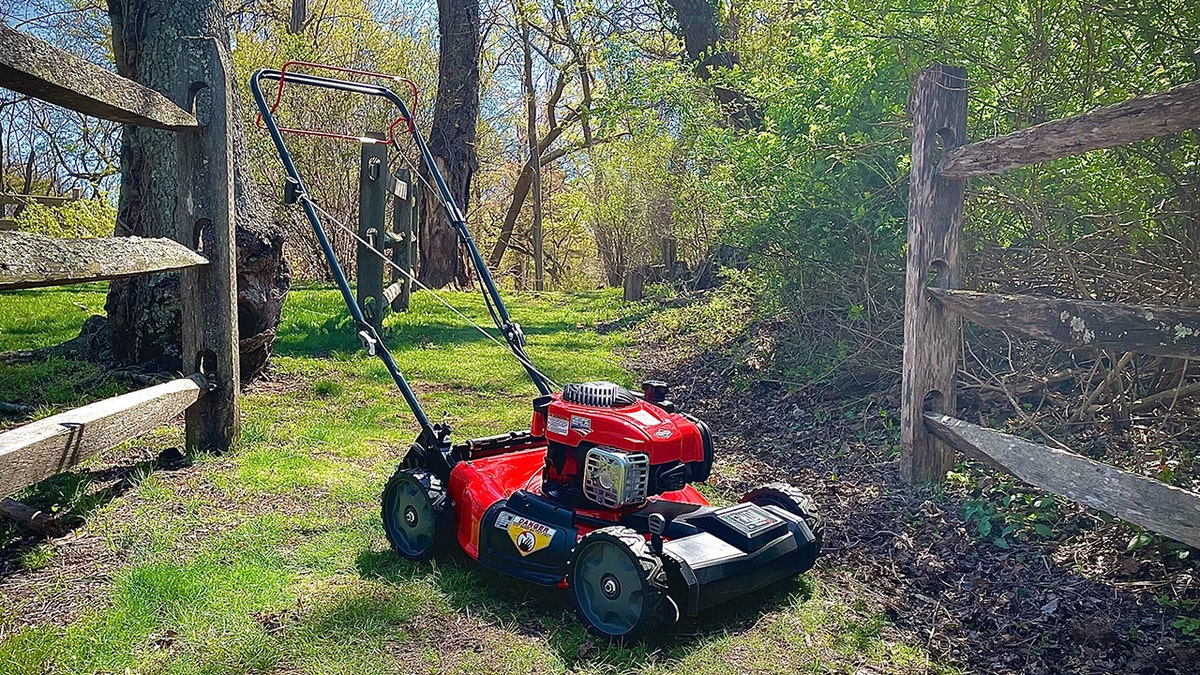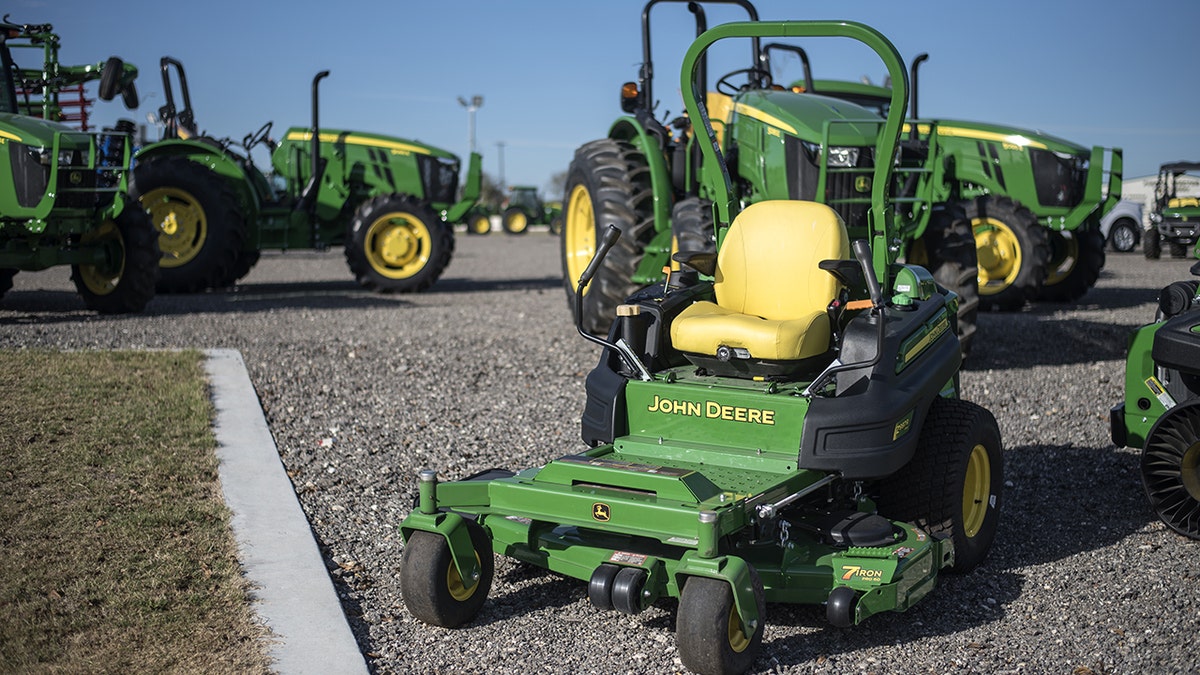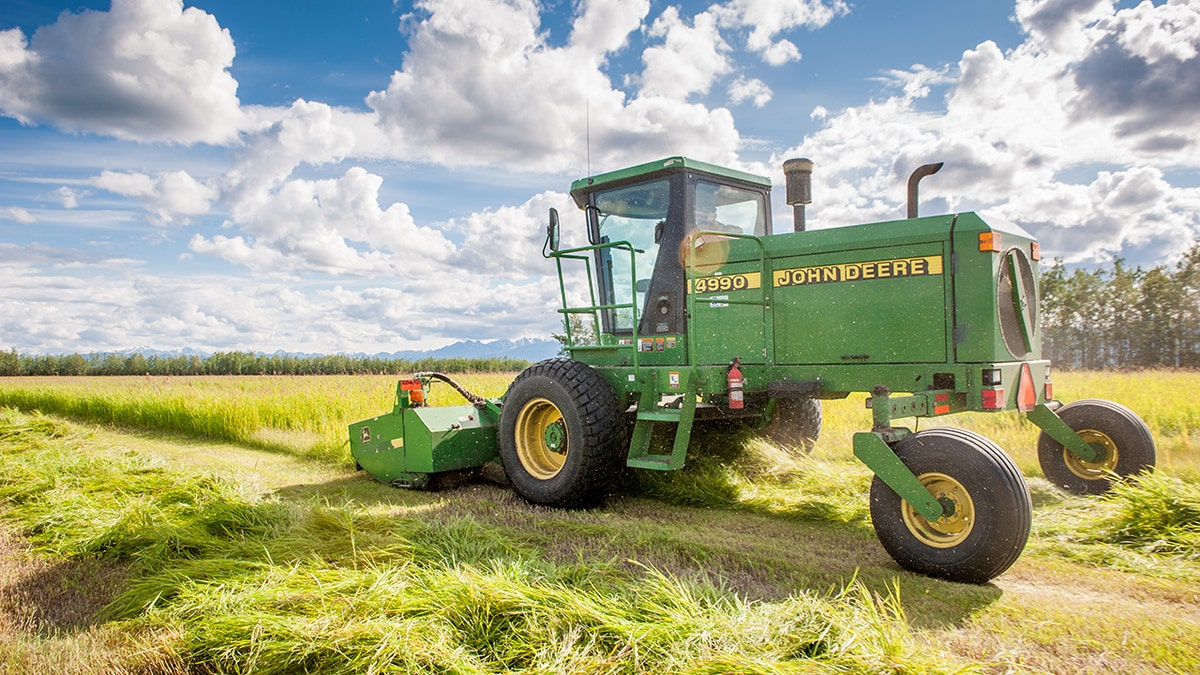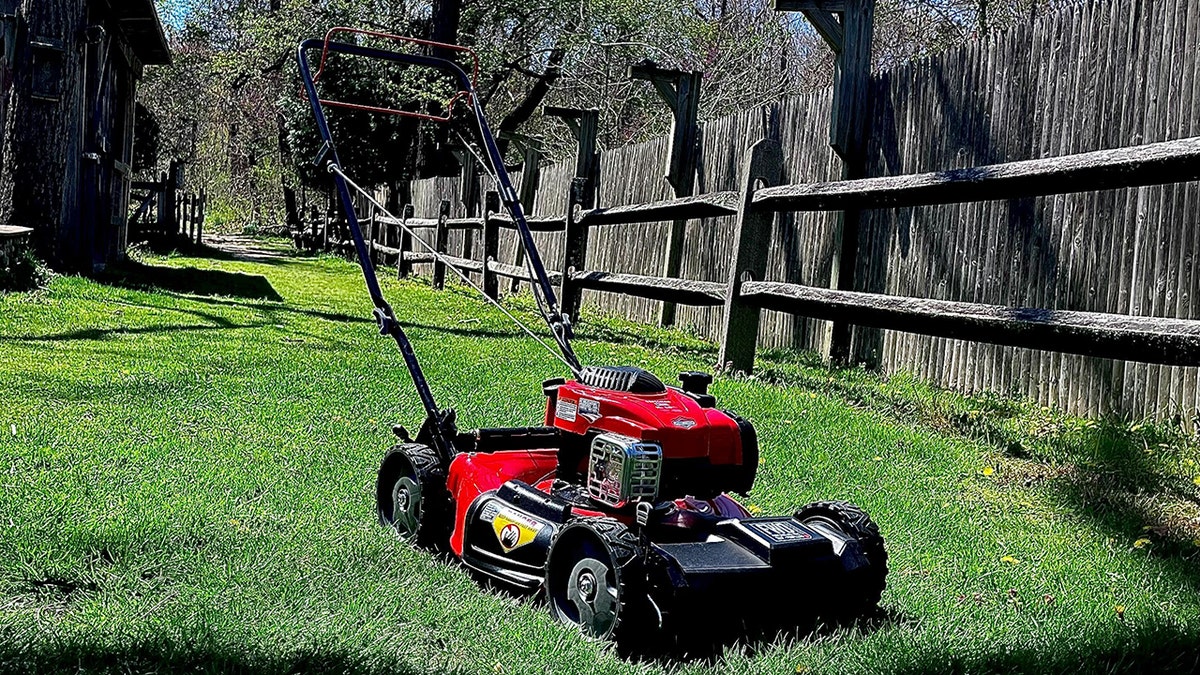Skip Bedell's tips to get outdoor spaces ready for spring
'Fox & Friends' co-hosts join Skip Bedell in the FOX Square to check out top battery-powered tools.
Spring has sprung and your grass is growing. Are you ready to break out the lawn mower?
While the mere thought of mowing the lawn may seem like back-breaking work, there are more ways than one to make the job a little simpler and to maximize the results.
Fox News Digital spoke to John Deere's mass channel business manager Sean Sundberg, a native Texan and a 26-year veteran of the company, who shared exclusive tips to help all homeowners mow their lawns like pros.
BATTERY-POWERED TOOLS JUST MIGHT BE THE TRICK TO PREPPING OUTDOOR SPACES FOR SPRING
Sundberg reminded property owners that whether you love or hate the job of mowing, it’s always nice to have a lush-looking lawn.
Here are a few sharp pointers about cutting the grass.
1. Know that pre-maintenance is ‘paramount’
If you live in a state where the seasons change, your lawn mower has most likely spent some time in the garage or shed this winter.

A Craftsman mower sits on a grassy path at Hoyt Farm Town Park in Commack, N.Y., on April 29, 2022. (Jeff Gumin)
Ahead of your mower's spring debut, it’s best to perform a pre-season machinery check.
"Doing your pre-season work with your machine to make sure it’s ready is paramount," Sundberg said.
Though lawn care companies like John Deere offer maintenance for customers, DIY kits can be purchased for at-home maintenance. Mower owners should be sure to change the oil or check the battery charge; in addition, double check that the entire system is ready to roll.
GARDENING 101: 7 EASY FLOWERS TO PLANT THIS SPRING, PLUS THE TOOLS YOU'LL NEED
"When you go out there in the spring and you want to enjoy the fresh air and mow some grass, your machine is ready to go and it’ll start right away."
2. Sharpen your blades
Sharpening the blades on a mower may not be the first checklist item that comes to mind, but Sundberg suggested it should be done by a professional.

John Deere lawn mowers and tractors sit on display at a United Ag & Turf dealership in Waco, Texas, on Nov. 20, 2017. (Photographer: Sergio Flores/Bloomberg via Getty Images)
Having an independent dealer properly sharpen the blades can ensure the overall health of your lawn; the sharpening can be done a few times a year.
SPRING CLEANING FOR FORGOTTEN SPACES: TIPS FOR TIDYING UP UNCONVENTIONAL SPOTS AT HOME
A dull blade can rip at your grass instead of slicing it short — and blades that are not properly tended to can introduce diseases such as fungus or mold to your lawn.
3. Prep your lawn for the first mow of the season
The first order of business before every mowing is to remove any obstructions from your lawn. That includes branches and dog toys.
Along with doing a spot check of your lawn pre-mow, locate any dead and dormant patches of grass and prepare to mow those down short to start the growth anew.

A self-propelled disc mower is shown cutting a field of hay (grass). (Photo by Edwin Remsburg/VW Pics via Getty Images)
On the contrary, plan on mowing any patches of grass that are looking healthy and green down to a third of the height to "reinvigorate" your lawn.
The first order of business before every mowing is to remove obstructions from your lawn.
Take your prep a step further by aerating your lawn or fertilizing with a weed-and-feed product.
"Aeration in the spring and fall is fantastic," Sundberg said. "Fertilization will help give it that nice green, lush color."
4. Know your grass
No one is expecting you to be a grass expert, yet knowing the kind of grass that's growing on your property will help you learn how to treat it.

Freshly cut rye grass dries in the afternoon sun near Kauffman and Snyder Roads in Oley Township, Penn., on May 8, 2017. (Photo by Harold Hoch/MediaNews Group/Reading Eagle via Getty Images)
Different types of winter grasses will stay green throughout the year, such as rye or blue grass, but they experience extra stress over the summer and require more water to survive hot weather.
Summer grasses, such as bermuda or centipede, will go dormant during the winter and will have to be cut at a low level in the spring to thrive in the summer.
5. Set the mower's deck height
Maintaining a set height at which you’re cutting your grass is important for the overall health of your lawn.
3 SPRING REFRESHMENT TIPS FOR YOUR HOUSE AND HOME'S OUTDOOR SPACES
In the summer, let your grass grow a little longer to allow cover; that way, you can cut it to a standard height of three inches. This will prevent the roots from getting too much direct sunshine.
Your lawn can be cut a bit shorter in the early spring and fall, but switching up how many inches you’re lopping off per each mow could damage the grass.
Sunberg advised not cutting more than one-third of grass blade height at a time to prevent further stress on the lawn.
6. Consider mulching
Mulching your grass is the secret sauce for a healthy lawn.

A Craftsman mower is shown parked on a grassy lawn at Hoyt Farm Town Park in Commack, N.Y., on April 29, 2022. (Jeff Gumin)
Spreading lawn clippings back onto the grass — or even mowed-over fallen and collected leaves in autumn — will provide extra nutrients for the roots.
Mulching can be done with mowers equipped with a discharge deck. It spits trimmings out of the side of the mower; or the clippings can be bagged for re-distribution.
7. Alternate your route
An ideal lawn for many might be the checkered baseball field at Yankee Stadium.

The Boston Red Sox stand on the third-base line during introductions before the start of the game against the New York Yankees at Yankee Stadium in the Bronx, on Apr 8, 2022. (Tom Horak-USA TODAY Sports)
While your lawn might not be as expansive, alternating the direction in which you're mowing will give it that crisp, striping aesthetic.
Alternating directions will also save the grass blades from bending in that same way while also preventing soil compaction issues.
8. Realize timing is everything
Keeping to a consistent schedule of mowing the lawn is important for a pristine outcome, especially when springtime grass grows back fast.
CLICK HERE TO GET THE FOX NEWS APP
But when time inevitably gets away from you and your grass grows a little longer than usual, be sure to increase your deck height to ensure that not too many of the blades are clipped at once.
If needed, give a second mow to return the grass to normal height.
9. Consult professionals
If you’re in the market for a new mower, Sundberg suggested seeking the help of a professional who will match you with a mower to fit your needs and your property's needs.

The John Deere logo is displayed on a riding mower at Belkorp Ag on May 20, 2016, in Santa Rosa, Calif. (Photo by Justin Sullivan/Getty Images)
For the best care for your machine, engaging in a service package (that includes upkeep) with your local dealer is key.
"Doing routine maintenance on it will enable you to experience an unparalleled customer and ownership experience," Sundberg said.
CLICK HERE TO SIGN UP FOR OUR LIFESTYLE NEWSLETTER
The expert recommended John Deere’s zero-turn Z530M mower with a 60-inch deck, sold at Lowes and Home Depot.



